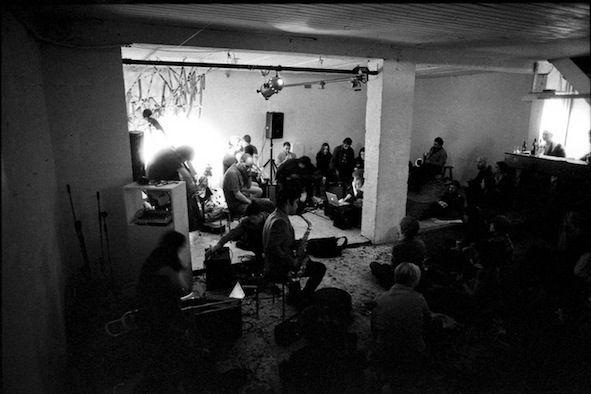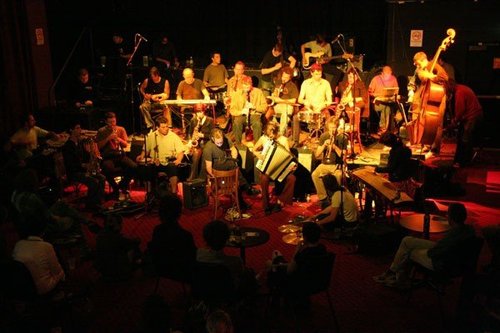Interview :: Jeremy Tatar of The Splinter Orchestra
March 25th 2013
FBi Radio

Imagine an orchestra with over thirty musicians – but no regular members. With traditional orchestral instruments – and laptops. With total improvisation – but no conductor.
Say hello to The Splinter Orchestra: a large-scale improvising ensemble based in Sydney. From accordions to laptop musicians, The Splinter Orchestra explores sound through their eclectic instrumentation and the use of layering to create new textures. Their lack of leaders or conductors proves to be an impressive example of self-control and skill.
Thanks to Firstdraft, you can watch the Splinter Orchestra this Thursday night – along with other talented experimental and improvisational artists Erk and Jonathan Watts. Ahead of the Night Depot #2 event, the Flog spoke to one of the orchestra’s organisers, Jeremy Tatar, about how the splinters splinter.
—————
Preface from Jeremy: I guess the first thing I should do is wave a big disclaimer and say that I can only speak from my own experience, and that everyone has a different relationship with the group. Maybe some of the other people in the group would completely disagree with what I think, but that’s also awesome and totally valid. That ‘tension’ is something that’s a part of the group and quite important in some ways as well.
—————
FBi: The Splinter Orchestra seems to be all about the art of improvisation. As a group organiser, how exactly does one go about organising such a special ensemble?
Jeremy: It’s quite easy in fact. Since there is no set membership of Splinter, it means that both gigs and rehearsals are relatively flexible. Or maybe it would be better to say that the group membership is in constant flux, and it is hard to say who is in Splinter at any given time. That’s part of the fun though. There is quite a large Excel spreadsheet with the email addresses of ‘current’ members, and so mass emails are the main way that we communicate.
The skill of improvisation is always admired as one of the hardest things to master as a performer. How do you go about finding so many talented musicians?
For a vast majority of people, I think it’s more a case of them finding the group, whether by word-of-mouth or through friends already playing in it. I know that when I first joined in late 2010, I was interested in the group and the music they played, so I asked if I could join. Probably in the beginning (early 2000’s) there was more of an active “search” for members, but now that Splinter is fairly established people seem to join more organically. The relative size of the group remains pretty constant though, with people losing interest, moving to Berlin, becoming rappers, or just being unable to find the time.
You have such a wide array of members from different music backgrounds; how would you go on about describing your sound?
Haha I think that we talk about this a fair bit. For me, ideally, it sounds like a large group of people listening to each other.
The uses of both electronic and “classical” instruments are prevalent in your music and add such a great depth to your sound. How important is this large incorporation of instrumentation to the band?
Although it does matter to some extent, I don’t think that instrumentation is such an important consideration for us. I suppose that this goes back to the constantly changing membership. I can say pretty confidently that there have never been any two concerts (or maybe even rehearsals) with the exact same people playing. At one point there were more than 5 bass players. Now there is at best 1. Sometimes half the group are saxophones. It’s still the Splinter Orchestra though.

When I think orchestras, the picture of a conductor waving around their gloved hands tends to come to mind. Because you don’t have conductors, can you explain how your live performances develop and how the members work with one another to prevent chaos?
This is another thing that we often talk about. To be honest, I’m not really sure how the performances work. I listen, I play. I try to listen more than I play. Sometimes the group is very loud and sometimes it is very soft. Endings can be tricky. A little while ago we were playing a lot of pieces, although recently we have just been improvising without explicit directions. I think that everyone has their own different strategies for avoiding chaos, although it still happens from time to time. Simply listening more/harder/better is probably the solution to most problems, as well as having an awareness of the space of others – and respecting that.
What does “band practice” entail?
Rehearsals are very different from the band practices we are probably familiar with from school. They are generally far more relaxed, and there is definitely a strong social aspect as well. We normally start with a free play – an improvisation without any instructions or guidelines. Then there is a little break, for cigarettes and talking. Then we will sometimes try a score that someone has brought in. These can range from simple to very complex. We’ll maybe play that piece a couple of times, to get used to it and consider its different angles. Or else we’ll just have another free play. For a few weeks last year we started having a game of soccer after the rehearsals. So many people came.
Firstdraft’s event seems to be a large celebration of improvisation and experimental sound. What are you most looking forward to?
I’m definitely looking forward to Jon Watts‘ solo set. I’ve seen him play solo a couple of times now, and he is both very challenging and very rewarding. It’s in a good ratio.
—————


